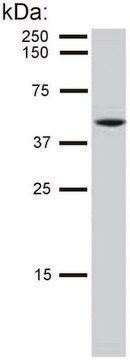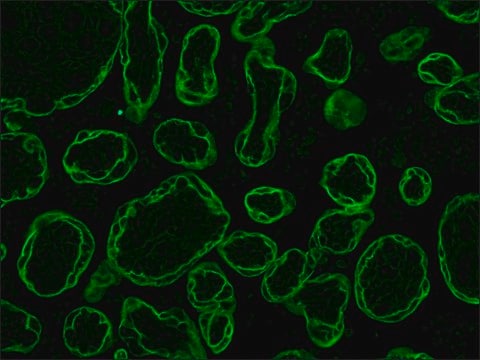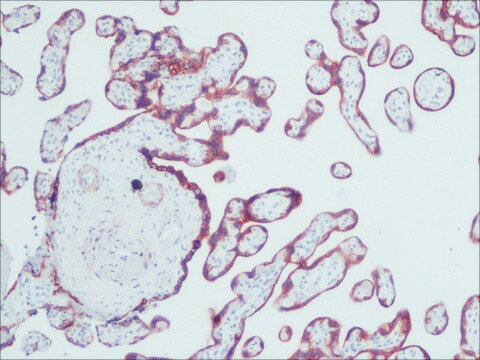C5301
Monoclonal Anti-Cytokeratin Peptide 8 antibody produced in mouse
clone M20, ascites fluid
Szinonimák:
Anti-CARD2, Anti-CK-8, Anti-CK8, Anti-CYK8, Anti-K2C8, Anti-K8, Anti-KO
About This Item
IHC (f)
WB
indirect immunofluorescence: 1:200 using frozen sections of human or animal tissue
western blot: suitable
Javasolt termékek
biológiai forrás
mouse
Minőségi szint
konjugátum
unconjugated
antitest forma
ascites fluid
antitest terméktípus
primary antibodies
klón
M20, monoclonal
molekulatömeg
antigen 52 kDa
tartalmaz
15 mM sodium azide
faj reaktivitás
feline, human, rabbit, canine, bovine
technika/technikák
immunohistochemistry (frozen sections): suitable
indirect immunofluorescence: 1:200 using frozen sections of human or animal tissue
western blot: suitable
izotípus
IgG1
UniProt elérési szám
kiszállítva
dry ice
tárolási hőmérséklet
−20°C
célzott transzláció utáni módosítás
unmodified
Géninformáció
human ... KRT8(3856)
Általános leírás
Egyediség
Immunogén
Alkalmazás
- immunofluorescence microscopy
- immunohistochemistry
- dot blotting
- protein preparation from bovine epithelial cells
- immunofluorescence
- western blotting
Biokémiai/fiziológiai hatások
Jogi nyilatkozat
Nem találja a megfelelő terméket?
Próbálja ki a Termékválasztó eszköz. eszközt
javasolt
Tárolási osztály kódja
10 - Combustible liquids
Lobbanási pont (F)
Not applicable
Lobbanási pont (C)
Not applicable
Válasszon a legfrissebb verziók közül:
Már rendelkezik ezzel a termékkel?
Az Ön által nemrégiben megvásárolt termékekre vonatkozó dokumentumokat a Dokumentumtárban találja.
Tudóscsoportunk valamennyi kutatási területen rendelkezik tapasztalattal, beleértve az élettudományt, az anyagtudományt, a kémiai szintézist, a kromatográfiát, az analitikát és még sok más területet.
Lépjen kapcsolatba a szaktanácsadással








